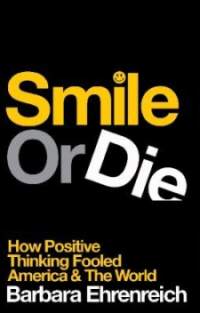Smile or Die - How Positive Thinking Fooled America and the World
reviewed by Mario Rinvolucri, UK
Smile or Die - How Positive Thinking Fooled America and the World
Barbara Ehrenreich
Granta 2009

Ehrenreich’s book is a very convincing attack on “positive thinking”, as her chapter headings make clear:
Smile or die: the Bright side of Cancer
The years of Magical Thinking
The dark roots of American Optimism
Motivating Business and the Business of Motivation
God wants you to be Rich
Positive Psychology: the Science of Happiness
How Positive Thinking Destroyed the Economy
Postscript of post-positive thinking
Ehrenreich shows how US capitalism has cynically seized on positive thinking and positive re-framing to present the sacking of half a workforce as a marvelous new career opportunity. The owners of the means of production even back this myth up by offering the people they are callously flinging into unemployment the fiction of a career’s advice service to help them towards a glorious future.
She demonstrates the cynicism of such actions with well-researched chapter and verse.
The book caught my attention because, as humanistic language teacher I, too, can be accused of propagating positive thinking in my students. I prepare them for exams by getting them to tell “success stories” about their previous victories and I encourage them to enter the exam room with these good times in mind.
Much of NLP, which I use, is based on can-do attitudes, on the idea that the individual can do much on his or her own. Well, maybe, sometimes, but Ehrenreich makes clear that this was not the case with her when she was diagnosed with cancer. People suggested she should approach her illness as a new opportunity when in fact she felt a mixture of disbelief, fear and fury.
I feel that anybody who reads HLT for its humanistic content will find much in SMILE OR DIE that challenges their beliefs and does so in ways that cannot be pooh-poohed or ignored. A challenge to embedded beliefs is a gift from heaven, I feel. I shall certainly use Ehrenreich’s book on my NLP course this summer to help nay-sayers to give voice to their iffy feelings as they work through, in and around NLP’s positivism.

Please check the Building Positive Group Dynamics course at Pilgrims website.
Please check the NLP for Teachers course at Pilgrims website.


|